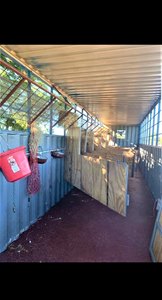The Stronach Group Institutes Cargo Ship Transport Ban


An executive from 1/ST Racing, a division of the Stronach Group, announced Aug. 17 that TSG would prohibit the cargo ship transport of horses leaving its facilities. In addition to other properties, the company owns Thoroughbred racetracks Gulfstream Park, Golden Gate Fields, Laurel Park, Pimlico Race Course, and Santa Anita Park.
In an open letter published on social media that was addressed to trainers, owners, and connections, Aidan Butler, COO of 1/ST Racing, stated that "any trainer or owner who is associated with shipping horses via cargo ship will no longer be welcome at any of our training or racing facilities."
More so than its other tracks, TSG's action impacts horses participating at Gulfstream Park due to its closer proximity to the Caribbean island of Puerto Rico. Lower-level horses from Florida—and from other jurisdictions—have been transferred or sold to race there in recent years, and cargo shipping has provided a lower-cost but a higher-risk method of transport. Shipping by boat can take two days and sometimes extend beyond that before unloading is completed. By contrast, air travel takes two to three hours.
In tight, at-sea conditions, the longer travel time can sometimes have fatal consequences or more commonly, leave a horse dehydrated upon arrival.
MITCHELL: Dark Voyage: Dangers of Cargo Shipping to Puerto Rico
"Obviously, there have been some mentions in the press," Butler said. "I did some looking into it, and there is nothing about it—in my opinion or from the people around me—that is humane. It's just not. It's not a way to treat a horse. So it was a pretty easy discussion, but I wanted to take the time to get feedback from all the stakeholders, explained it to them, and had questions if anyone wanted to ask. Everyone gave me their full support from our jurisdictions. It's something we feel strongly about."
Butler said the cost difference of the two shipping methods is approximately $1,200. BloodHorse previously reported the difference can reach $1,500.
"There is a right way and a wrong way to do it," Butler noted. "As an industry, we have to be over-cautious when animals are finished racing. Most tracks are doing a good job trying to keep horses as safe as they can be, but when this sort of stuff is happening, it just sort of makes a mockery of everything."
Butler's letter indicated trainers and owners shipping horses "are responsible for performing the required due diligence to ensure horses in their care are transported in safety by humane methods. Failure to prevent the shipping of horses via cargo ship will result in the immediate removal of the associated owner and trainer's horses from any, and all, 1/ST Racing venues.
"I have communicated with the horsemen's groups in each of our jurisdictions in California, Florida, and Maryland and have received their full support on this issue."
Butler believes other tracks outside TSG have begun prohibiting the cargo ship practice or are considering doing so.
"Hopefully other people join in as well. There is no need for this," he said.
TSG's restrictions will be implemented by house rule. Butler said their action was an animal welfare decision, not one designed to retain its existing horse population.
